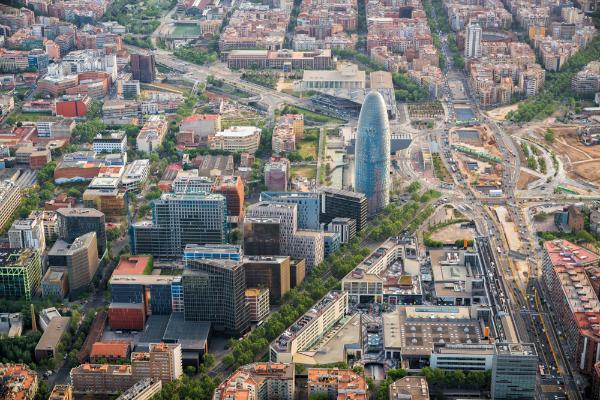
- The agreement between the Municipality of Barcelona and the EIB will promote urban regeneration through investments in energy efficiency and social infrastructure.
- 1 500 jobs will be created during the construction phase as part of the green recovery.
- The projects promoted will help the city’s economic recovery and job creation.
The European Investment Bank (EIB) will finance around 40 projects in Barcelona that aim to support climate change mitigation and adaptation in the city. To this end, the EU bank will provide €95 million to promote urban regeneration, with a focus on the environment but also on social inclusion and job creation to boost the economic recovery in the wake of the COVID-19 crisis.
A significant portion of the EIB funding – up to 25% – will go towards investments to regenerate an area covering some 200 000 m2 across the city, reshaping urban design around the concept of “superblocks” to give residents better access to facilities in their neighbourhoods. This involves grouping buildings into blocks where traffic is only permitted around the perimeter and priority is given to pedestrian areas, low-speed zones and recreational green spaces. It is worth noting that Barcelona actually declared a climate emergency in January 2020 and that the investments now being promoted are in line with the declaration’s objectives.
In addition to strengthening the city’s climate resilience, the projects financed under this agreement will promote social inclusion, with the EU bank funds also going to the construction and renovation of educational institutions such as nurseries and schools, sports facilities, a new library and care homes. Around 20 projects will target areas within the city classified as vulnerable. All new social infrastructure will come in the form of nearly zero-energy buildings. The financing provided by the EU bank will also support initiatives to improve energy efficiency, which has been a top priority for the Municipality of Barcelona in recent years. These include initiatives to improve the electricity consumption of public lighting and of municipal buildings and facilities. Improvements will also be made to urban bus lines and cycle lanes across the city.
At the same time, these investments will help boost the economic recovery following the crisis caused by COVID-19, employing 1 500 people during the construction phase.
EIB Vice-President Emma Navarro, who is responsible for the Bank’s operations in Spain, said: “Adapting our cities to a more sustainable model is key to achieving the EU objective of climate neutrality by 2050. As such, one of the EIB’s main priorities is to support urban regeneration to promote clean and inclusive growth that benefits the public while also helping to combat climate change. We are pleased to be signing this agreement with the Municipality of Barcelona to promote investments that will have a huge social and environmental impact on the city. It is yet another example of the EIB’s commitment to a green recovery in Spain.”
Deputy Mayor of the Municipality of Barcelona Jaume Collboni highlighted “Barcelona’s commitment to climate action, the green economy and the green transition to a healthier city and greater well-being for its people. The 40 projects to be implemented through this agreement between the Municipality of Barcelona and the EIB will help drive these green policies, which are a priority for the city. The agreement also comes as some good news as the city grapples with the repercussions of COVID-19, as it will enable the administration to free up money from the budget to better respond to the crisis.”
This is the EIB’s sixth operation in Barcelona facilitating investments in urban infrastructure and social housing. The first was in 1990 with an agreement enabling the renovation of the historic city centre.
The EU climate bank
The EIB is the world's largest multilateral provider of climate finance. Its goal is to be a leader in mobilising the finance needed to limit the average global temperature increase to 1.5°C compared to preindustrial levels in order to meet the Paris Agreement objectives. On 14 November 2019, the EIB Board of Directors approved its new climate objectives and the new energy lending policy. The Bank will gradually increase its financing for climate and environmental objectives up to 50% by 2025, with the goal of ensuring that the EIB Group mobilises at least €1 trillion in the critical decade between 2021 and 2030 to promote investments helping to meet these objectives. It also announced its intention to align all EIB Group activities with the Paris Agreement. To this end, the EIB will cease financing fossil fuel-based projects from late 2021.
The EIB is the world’s largest issuer of green bonds and was the first organisation to make an issue on this market in 2007.